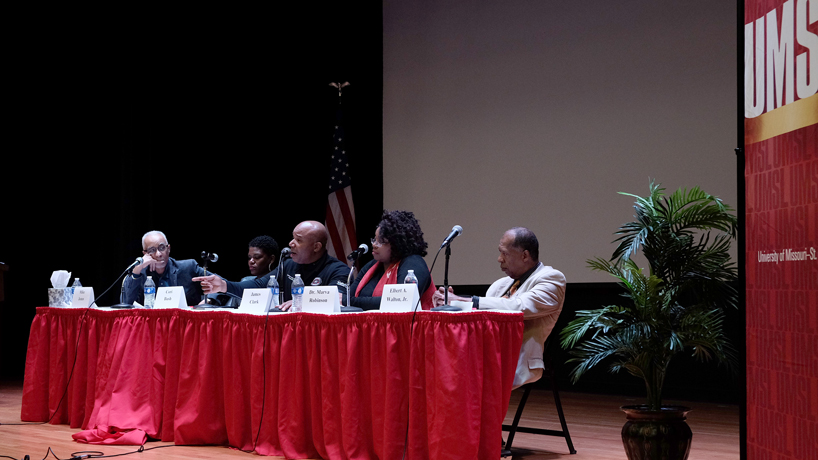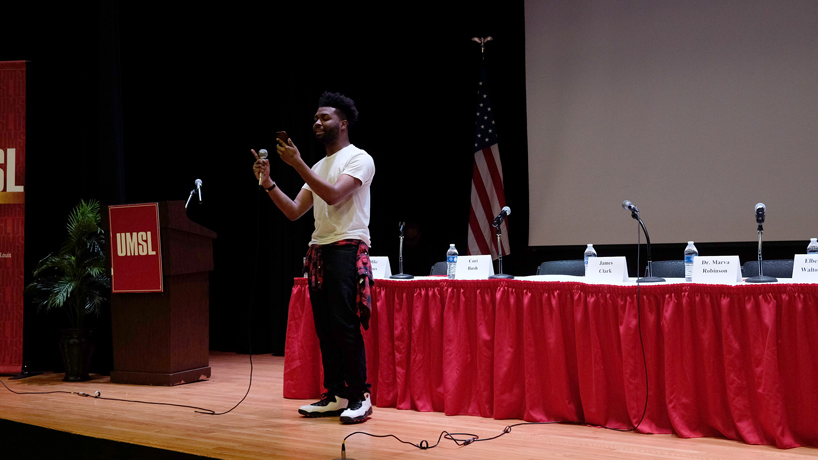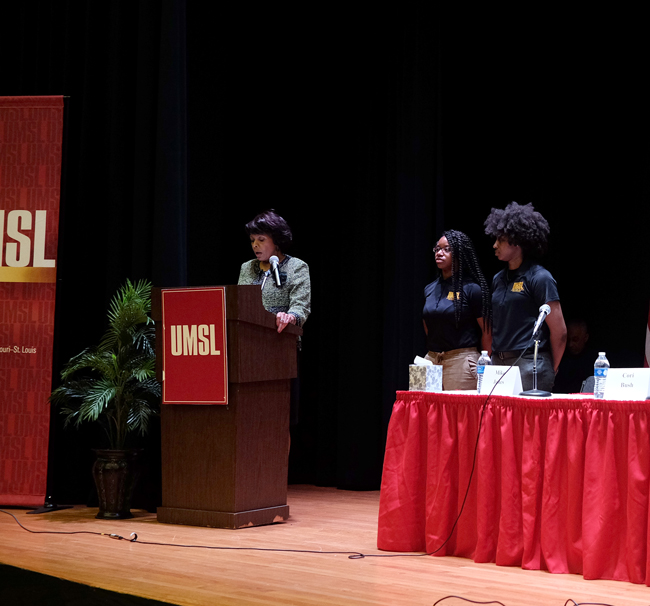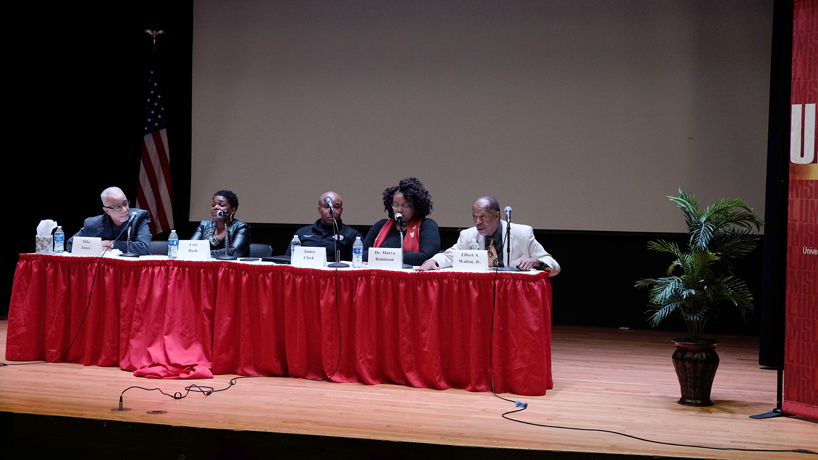
James Clark of Better Family Life (center) makes an impassioned point while part of the panel for “Black in St. Louis: Sculpting the future,” an event put on by the African American chapter of the UMSL Alumni Association and the Associated Black Collegians Feb. 23 at the J.C. Penney Auditorium. Clark is flanked by (from left) moderator Mike Jones and panelists Cori Brown, Dr. Marva Robinson and Elbert A. Walton Jr. (Photos by Steve Walentik)
Steven Smoote set a course for the evening of Feb. 23 when the University of Missouri–St. Louis student climbed onto the stage at the J.C. Penney Auditorium and read aloud one of his poems.
He declared, in part: “We are all kings and queens … created in God’s image to put something positive back into this world, to be the generation that makes a better life for our future children, our boys and our girls.”
So began an event titled “Black in St. Louis: Sculpting the future,” a panel discussion and community forum convened by the African American Chapter of the UMSL Alumni Association in conjunction with the Associated Black Collegians.

Communication major Steven Smoote reads aloud one of his poems to open the “Black in St. Louis: Sculpting the future” event.
UMSL alumnus Mike Jones, a former member of the St. Louis Board of Aldermen with more than 30 years of experience in public policy, moderated the nearly 90-minute conversation.
Pastor Cori Bush, co-director of the Truth Telling Project, joined clinical psychologist Dr. Marva Robinson; attorney, former state representative and UMSL alumnus Elbert A. Walton Jr.; and James Clark, the vice president of community outreach for Better Family Life, on a panel that touched on issues standing in the way of the community, particularly its youth, while also positing some solutions.
Robinson laid out some of the intractable problems youth face.
“Every parent has to be aware that their child will be taught, whether directly or indirectly, that they, as a black child, are inferior,” Robinson said. “There’s no doubt about that. From not having anything on the walls that look like them, from having textbooks that don’t validate them until you get to the slavery chapter, from the way that teachers may not allow them the same privilege of innocence that they may their white counterparts. … With that, their child may experience racial stress.”
She noted that such stress can cause anger, anxiety, paranoia, helplessness, hopelessness and frustration.

Linda Brown Reed, president of the African American Chapter of the UMSL Alumni Association, turns the program over to Associated Black Collegians members T’Keyah Blockton and Brandi Fields (at right) to introduce the panelists.
“So what’s important for our children today,” Robinson said, “is to be taught how to use their words, for them to know they have a safe space to talk about these things at home and that parents are more open to digging beneath the surface. Not just seeing a suspension as them acting out or not just seeing them not wanting to go to school as trying to scapegoat or avoid.”
The discussion later moved to how to combat racism, not in the form of individual bigotry but that exists systemically in society.
Bush argued for the need for more civic engagement from community members.
“I think our own ignorance to what’s actually happening and what’s going on keeps us in this place where we are under structural racism and we seem to just live in it,” she said. “It’s like it’s here and we just allow it, and it’s because we don’t allow ourselves to go into places where the information is. But one reason we don’t go into places where the information is is because we don’t know that’s where it is.”
There was tension between Walton, a member of UMSL’s second graduating class, and his fellow panelists about the manner in which a younger generation of leaders has tried to effect change.
“We had a goal and said if we accomplished that it was a victory,” Walton said. “That’s one of the things that I’ve seen missing. When I was looking at the Ferguson movement and the Black Lives Matter movement, I asked myself, ‘When can they declare victory?’ We perceived a victory as ‘We got this piece of legislation passed that was going to give us what we needed.’”
Bush and Robinson both objected to the suggestion that not enough effort had been made in Ferguson to change laws and unseat political leaders standing in the way of progress.
Clark joined the conversation late but delivered an impassioned speech about what he sees as misplaced priorities. In particular, he questioned the wisdom of projects such as the trolley in the Delmar Loop and the proposal to build a soccer stadium on the western edge of downtown when issues like gun violence and prostitution persist in some neighborhoods.
“You want to look at Ferguson? Ferguson is not ground zero. It’s not,” Clark said. “There are neighborhoods in north St. Louis, there are neighborhoods in south St. Louis, there are neighborhoods in north county, and there are neighborhoods in East St. Louis that make Ferguson look like Ladue. But we’re not moving in that direction. There’s no outcry about the conditions in our neighborhood. Why? Because it’s not popular. Because it’s not going to get you likes when you post it on Facebook.”
















